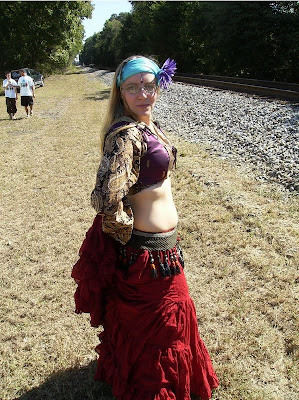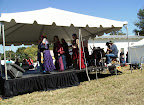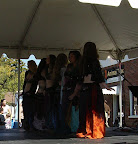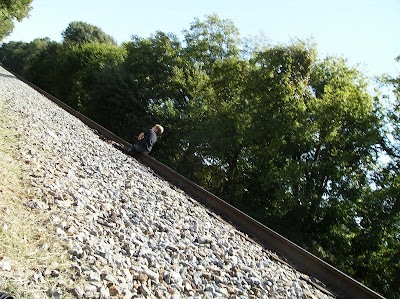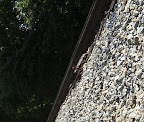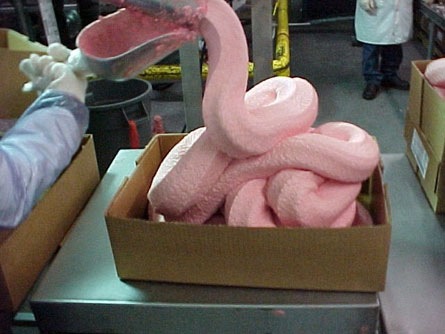2010: Week 40 Blots
BLOT: (10 Oct 2010 - 03:02:37 PM)
The Madison Street Festival (October 2nd, 2010) [Mom and I, Bellydancing, and The Boy. w/ some pics]
Right smack dab in the middle of one of the busiest fortnights I have had during my grad school career, two things occurred: my mom came up to visit and Sarah had a bellydancing performance at the Madison Street Festival. Which meant that the two events could be combined, my mom would get to go the festival and watch Sarah dance. This also meant that the weekend, for me, was practically shot. I could have begged out of going, maybe, but let's be honest: I have no spine. Mom + wife is something like an unbreakable responsility. You know and I know the price to pay would be too high.
[Note: click on this picture, and the rest, to see a larger version]
THE FESTIVAL
Think something like Panoply, except smaller, less authentic feeling, with more vendors, and people doing their best to emulate the "rabbits squishing each other" scene from
Sarah went over to her stage and started getting ready, and my mom and I had half-an-hour or so to wander around. My mom originally planned to park on a bench and wait, but I got her to come with me. As a note, walking with my mom in crowd is an experience. She flies through things I find interesting, sometimes with snarky comments, and then will plant in front of some display that I barely noticed and had no care to notice. Case in point: she loves cloth things. We would come up to a booth full of towels and she would drift over. I would go over to some wood carvings and she would say, "Hmmph, made in China," and then walk off. Toss in enough people in my personal bubble to violate fire code and there you go.
After skirting down a row of booths that were mostly advertisements and political, I found a second row that were more crafts. Then I found a row that was made up of local and near artists. As the rows interested me more and more, they were also less crowded (there were very few people on the artist row, too many people on the advertisement/cause row). I guess this works out because the more I wanted to browse, the fewer people I had to contend with.
Along the artist row, I came across Yuri Ozaki's booth. I bought one of her smaller watercolors showing a sunset scene across Big Spring Park (similar in subject to this one, and I would guess the same dimensions, but slightly different angle and overall color scheme). I am a huge fan of watercolor as a medium, especially "sloppier" watercolor that dances around impressions of scenes as much as pure shapes of scenes. Yuri's regularly involve downtown Huntsville scenery and I have wanted to get a couple more for a bit (I had a night time at The Kaffeeklatsch one, already). Night time, sunset...I guess I need to pick up a day time shot of somewhere else near downtown and display them as something like a triptych.
BELLY DANCING
We got back over to the stage in time for the performance, which started about fifteen minutes late. The stage wasn't very big, and the "backstage tent" was some tiny thing that couldn't have been enough room for them to get ready. The only source of shade nearby was the stage itself, which meant that the viewers and the dancers had to sit out in the sun, which was just hot enough to be uncomfortable. I picked a spot near the railroad tracks over to the right.
Their set list was similar to what they had at Panoply. Sarah was in a dance that she wasn't in, there, maybe even a couple. I'll get confirmation from her. Unfortunately, a combination of the relatively darkness of the stage with the not good quality of our digital camera left a lot of shots to be desired. Add to this a slightly delay that would often come up between pressing the shutter button and the actual camera taking a shot, and you had less than twenty really usable pictures out of over a hundred taken. Ah, well, c'est la digital photography.
THE BOY AND THE BALLOONS
Pretty much the entire time that Sarah was on stage, there was this young boy running around on the railroad tracks. A few minutes into this activity, he started gathering up pieces of scrap iron that were scattered on and near the tracks, and piling them up.
Over the half-hour to hour of dancing, he had a nice little pile building up. At the end, he even started to stack it in strange ways on the tracks themselves, making these odd little structures out of it. Then some festival volunteers ran over and started shouted that he couldn't be doing such a thing. He told them, very matter of factly, that his dad had said he could. Eventually some head honcho of the volunteers came over and started knocking the iron piles around and scattering them. The Boy's dreams of an iron city were dashed, and he went back over to watch the dancing.
Also competing for my attention was a series of balloons that kept drifting up into the sky. Lots and lots of balloons. Some were probably let go on purpose, but I imagine others were more accidentally "dropped". I tried taking pictures of these floating balloons, but often my camera would decide to focus on some other, random spot in the sky and the balloons would be some out-of-focus speck on the side. The only one I regret not being able to keep was a shot of the balloons floating in front of the moon.
And that pretty much wraps it up. Still haven't had much down time since then, and will be getting some today. Enough good things happened because I went to even out the bad, annoying, or tiring things.
Oh, afterward, went to Pizza Hut with my mom. Kind of an odd experience. She doesn't often go to restaurants and hang out for a bit. Fact is, when I was growing up, I don't think I ever saw her eat in a restaurant. She would get the food to go and then eat it in the car, sometimes on the road and sometimes in the parking lot. Sarah and I had slotted an hour to eat and relax after the Festival, and about twenty minutes in, my mom was already talking about leaving and how she was going to get her drink to go and such. We looked at her and said, "Um, we're still eating and relaxing." She went outside to smoke and I ordered desert. We even told her this when she got back but about five to ten minutes later, she starting staring at the waitress and making grunting noises. I asked her what was wrong and she asked, "Where's our check?" in a frustrated way. I told her, again, the rest of our meal hadn't showed up yet. After that, she calmed down. Next time she comes up, I'll take her to the sort of place you get your meal in stages so she can see that not all food has to come out at once and be treated like fast food.
TAGS: Me in 2010, Huntsville Festivals, Huntsville Artists
BY WEEK: 2010, Week 40
BY MONTH: October 2010
BLOT: (05 Oct 2010 - 10:45:04 AM)
I love the fact that someone not only conceived of this to sell cellophane, but drew it out...

Other fun ones at Cracked.com's 13 Wildly Irresponsible Vintage Ads Aimed at Kids (Note: most weren't actually aimed at kids, just had them in the artwork). Got to love the last one...

And this one...which almost feels like something out of a wrong sort of 1970s movie...

BY WEEK: 2010, Week 40
BY MONTH: October 2010
BLOT: (04 Oct 2010 - 06:34:07 PM)
Let's play guess what this is...
Guess what the yummy pink stuff is below. Look at the picture, and when you have your guess ready to go, click the picture to follow the link...
BY WEEK: 2010, Week 40
BY MONTH: October 2010
BLOT: (04 Oct 2010 - 06:20:45 PM)
Doctor Who Virgin New Adventures #28 - Blood Harvest, by Terrance Dicks
"This next bit is best viewed from behind the sofa." [Ace]
Just for purposes of full disclosure, let me admit that I avoided the
For instance,

Notice I used the word "fun" up above. I would say the two novellas and a story hook (which later was revisted and in the Gallifrey segment of
I like the main baddie. I like some of the Capone aspects. I kind of like the hardboiled companion. Doesn't really feel like the Seventh Doctor. Doesn't really feel like Ace. Romana is just there, mouthing lines. Benny is one of the few recurring characters kept in character and I liked the follow-up to Ivo. The expansion of "The Vampire Planet" is nice, but the expansion of Chicago feels half-finished. The writing is alright, but the triple headed plot needs to be lashed together better (and one or two heads could have easily been lost). The overall product is pretty Meh, mostly recommended for the set-up to later novels and for a glimpse into some Behind-the-Scenes of Dicks' mind.
TAGS: Doctor Who
BY WEEK: 2010, Week 40
BY MONTH: October 2010
BLOT: (04 Oct 2010 - 03:19:33 PM)
Kazuo Ishiguro's Never Let Me Go [Review]

Of course, this begs the question of whether or not
Now, the second important question when it comes to this book. How. Much. to. Spoil? When this book came out five or six years ago, just about no one spoiled a damned thing. You were lucky if someone would get past "There is a girl named Kathy H., and she...um...stuff". I have never seen a book's content so protected. I suspect reasons may not have been altogether altruistic. See the above two paragraphs about why certain types of reviewers might avoid certain keywords to the plot. We are talking Man Booker shortlist material, not the pulp-stand at a local flea market. Looking back now, though, how much of a book is sacred? Can you spoil the first few chapters? The first third? The first half? Does it really matter? Should a book stand on its own? I don't know. Each book has its own level of plot secrecy that must be maintained. I could tell you right now that Captain Ahab does not survive

Hailsham is your typical repressed passions boiling under an idyllic surface British boarding school straight out of "making English-majors-to-be sigh" literature. Students form cliques, play games, get hot and bothered and worried about the degree of the bothering, make art, prank teachers, and try to decipher things above their maturity grade. Days of no circumstance fill up with a mixture of arbitrary rules and childish indiscretion. Except the days of no circumstance are the opening salvos to a truncated life expectancy. Classroom admonishments to avoid smoking, to stay healthy, to be productive, and to be creative are not merely motivational endearments cited by rote, but something more akin to following warrant instructions: these kids are not normal children, but living pods of healthy organs being raised for later harvesting when they come of age. The byproduct of a new scientific age of medical marvels. No one need fear cancer or heart disease any more. There is a cure, and it is grown inside of school children. The only cost is they have to die for you to get it.
Kathy H, the narrator and central character, is a somewhat standard kid. Nothing exceptional, except that she seems better at being a carer than most (carers are students who take care of others, the donors, at medical facilities). Being a carer is not a career path, but more of a early days introduction to the service (all carers eventually become donors, and it is implied that most, but not all, volunteer for the change-over). Ruth, Kathy's best female friend, is your archetypal strong-headed ringleader. Her and Kathy have a number of falling-outs and getting-togethers. Tommy, arguably Kathy's best friend and the source of a lot of forlorn tension from her despite him actually being with Ruth, is more of the blockheaded sort, played off as something of a simpleton with anger issues. As Kathy brings us through their time at Hailsham and into the decade or so past it, most stories are staged as being memories shared between them during later carer-donor sessions (she ends up being carer for each of them, at least for a time). What counts as something of a love triangle (but in classic, Ishiguro understatement for the most part) is contrasted to the medical horror surrounding their lives. Just another impediment to gather their rosebud's while they may, so to speak; because the flowers will very much be dying, and not far down the road.
![Never Let Me Go - UK [hardback?] Cover](http://lh6.ggpht.com/_YNCs48kKetI/TKoRExSkeDI/AAAAAAAABzc/4PsdtsryVwM/s400/58188.jpg)
Now that spoilers are out of the way, and hopefully some of you are still with me, let's take a look at the pluses and minuses of the book. First, the pluses. (Plusses? No, spell-check is telling me just one s.) We have a compelling idea, characters almost impeccably complicated, a deep sense of pathos nearly overwhelming, and a calm and measured narrator that never tarts things up. Ever. Even when she should. This later is a plus because a number of other, like novels might have been tempted into something like the sticky realm of grand speeches, big events, or *gasp* action sequences. By keeping it running with the even keel of a cup of mild Earl Grey, white, on a slightly damp morning, we are able to digest the utter despair of the proceedings a little more elegantly. Make no mistake, this book is the most genteel depiction of horror since
And the plot works well as a major allegory on the truth of education versus real life. Just like
This is not to say that Ishiguro's work is without flaws. It feels unnecessarily tooled for book clubs, with a few omissions on purpose to dredge up discussion. The omissions hurt. As much as I personally appreciate a book that leaves some things up in the air, that lets background details surface sparingly, this only works when you write them out and then delete them after-the-fact. How does the system described a few paragraphs up work in light of the main character driving around the country side and tending errands and duties? And field trips? Is 30-year old Kathy willfully ignorant of the world around her? Or is she unable to comprehend the bigger picture? More fodder for book clubs, I guess. Her understanding of the world is limited to road maps and historical example. The big reveal about the meaning/outcome of their fate was the sort of thing that could have been researched in a local library. It loses some punch when you realize that we were lead along on a tether rather than out of necessity (most science fiction novels of the sort have actual secrets involved, that are discovered through force of will).
How does the medical reality of what they face work, for another? Quiet euphemisms like "Second" and "Third" and "Completed" overlay a confusing, and likely infeasible, reality about what would be happening.* The use of double-speak is the point, I suppose. The reality is something inevitable and mostly untenable. We put it in polite words and somehow it seems more acceptable, which has the ironic, and intended, consequence of making it altogether rougher on the reader's nerves.
And where is reaction from other-than-character sources? We are given only a brief, second-hand glimpse into the way the world works and the glimpse does not hold up superbly well under scrutiny. It is a backdrop painting meant to be another-England, and while it holds the stage, it is only through the "willful suspension of disbelief" that it has any hope of working. The scalpel's edge of analysis can make several deep cuts.
The biggest drawback to the whole book is the way Kathy tells the whole thing with emphasis on the building reveal. Imagine talking about an outing to a friend and saving the big punch line until the end. Fine, right? Now, imagine saving up a dozen minor plot points to be carefully hinted at over time with varying degrees of twists tossed in as you go. With keywords and thematic linguistics to lead the listener along. Oh, and half of your story's subsections begin with a blunt-force level of segue. If you are about to talk about the night you George went skinny dipping, then you begin the story like this: "Before I talk about George's sexuality and his later days campaigning for his local paper, there was the time where we went skinny dipping, and he had the encounter with a bee, when it was spring out and lessons were learned." Every time. It makes the whole thing feel like a series of confessionals, which is probably the intent, but the book is not properly staged as a series of confessionals, and several segments are prodded by this technique into a false stuffiness.
As the past catches up with the present, though, the stuffiness decreases and the last few chapters (told near the time of the narration) are more fleshed out and less hazy, as they should be. The characters have grown up in the course of the narrative, and feel very human, and the overall experience is haunting and complete. The kind of reading you cannot deny, even if you are put off by the subject or the handling. It has merit in the way that more accessible books often do not.
I found myself wondering if the book might have been handled better by a "less distinguished" writer, someone like Philip K Dick who might have tossed the subject out in the open early on, dealt with it bluntly, and then worked through the twists of existential terror in it with less delicacy and more soul. It would be a different book, with a fresh set of flaws, but it would add depth to the parts of this book that are quite shallow (and, no doubt, vice versa). The end product is powerful despite its issues, tear-jerkingly sad, and brutal on the nerves and heart. It is a Good book, a likable book, and one I do recommend if you are in the mood for it. Oh, and there is a movie just out, which looks like it tries to fix some issues of the background world but, by the trailer, likely at a cost of nuance. In some ways, it might be the equivalent of me getting my "wish", above.
* This footnote will contain a degree of spoilers, as well, though nothing specific. Bail out of it if you must... ... ... ... ... ... ... ... ... ... ... ... ... ... ... ... ... We are told that the organ harvesting comes in stages without any specifics at all about which organ goes when or where. Yet, one of the realities of organ donation is that losing a kidney means the rest of your organs suffer, losing something like a lung or a section of intestine will greatly impact the rest of your life, and there are other bits like hearts and stomach that will end it. There are also donations like blood and bone marrow that can be painful or destructive depending on quantity, but can go on more or less indefinitely. What could possibly contained in the first three donations that would give way to the fourth which is expected to the be the final (in the movie, it is implied the third is final) though some die after the second?
TAGS: Book Reviews
BY WEEK: 2010, Week 40
BY MONTH: October 2010
Written by Doug Bolden
For those wishing to get in touch, you can contact me in a number of ways

This work is licensed under a Creative Commons Attribution-ShareAlike 3.0 Unported License.
The longer, fuller version of this text can be found on my FAQ: "Can I Use Something I Found on the Site?".
"The hidden is greater than the seen."
